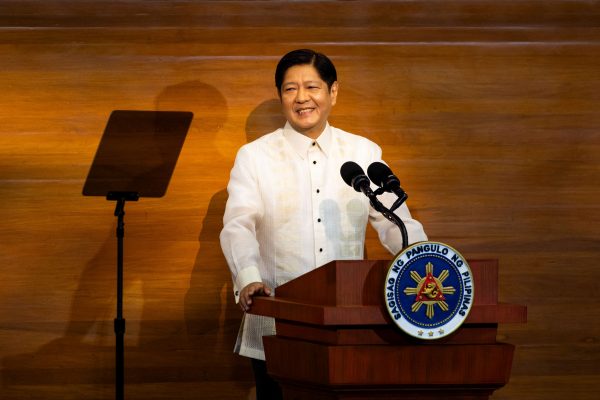In his second State of the Nation address, Philippine President Ferdinand Marcos Jr proudly trumpeted the dawn of Bagong Pilipinas (New Philippines). ‘I have stated before that my confidence in our future was grounded in our world-class quality workforce’, he said. ‘I know that the state of the nation is sound and is improving. The New Philippines has arrived’.
The new government slogan eerily evokes memories of his father — former president Ferdinand Marcos Sr’s Bagong Lipunan (New Society). His vision of the New Society was anchored in strengthening the economic, finance and trade agencies, opening the economy to foreign investment and introducing agricultural development. Ultimately, his regime was saddled by structural deficiencies, external shocks and crony capitalism.
But public opinion on the late strongman’s legacy has shifted during the post-authoritarian years. For some Filipinos, Marcos Sr may have been the greatest politician the Philippines has ever produced. A firm believer in destiny and greatness, Marcos Sr carefully wove his rise to power with similar narratives about the destiny and greatness of the Filipino nation.
But Marcos Sr also represented the ‘original sin’ of postwar Philippine politics — patronage politics inherited from the US colonisers coupled with the warlordism generated by the violence of the Japanese occupation during the Second World War. Marcos Sr masterfully used both to bolster his authoritarian regime.
Borrowing from his father’s playbook, Marcos Jr promises to deliver ‘a comfortable, resilient, and tranquil life for every Filipino’. But there seems to be a wide gap between promise and reality.
Marcos Jr’s speech highlighted his administration’s key accomplishments in the past year. But he also unwittingly exposed its deficiencies.
He vowed to boost local agricultural production by improving value chains and calibrating importation. But he continues to sit as Agriculture Secretary and has not appointed a permanent successor who can devote more time to the job.
On transportation, he offered an ambitious road network plan that would link the three major islands to spur economic development. Yet he was silent on the controversial modernisation of public utility vehicles affecting thousands of jeepney drivers. Like his father, he placed agrarian reform as one of his administration’s centrepiece programs by signing a law condoning the 57,557 billion-peso (US$1014 billion) debt of 610,054 farmers. But he was silent about raising the minimum wage for workers nationwide.
In January 2023, inflation peaked at a 14-year high of 8.7 per cent, more than double the administration’s 4 per cent target for 2023. Food accounted for nearly half of inflation over the past year.
In his speech, Marcos Jr claimed that prices of rice, meat, fish, vegetables and sugar have already dropped. But they still remain high for ordinary consumers. It also remains to be seen how much political capital he will expend to fulfil his promise of going after hoarders and smugglers who control the supply of these commodities.
During the first year of his presidency, Marcos Jr managed to sign only six pieces of legislation — including just three of the 42 priority bills proposed by his administration’s Legislative Executive Development Advisory Council. This lacklustre legislative output is puzzling given his administration’s high approval ratings, a ‘supermajority’ coalition in both chambers of Congress and his huge electoral mandate in 2022.
The president is open to using some of his political capital, as in the case of the passage of the country’s first sovereign fund — the Maharlika Investment Fund. The fund will serve as a long-term source of investment capital, fostering economic growth and job creation. The Marcos Jr administration will utilise it to finance various infrastructure projects such as roads, bridges and airports as well as attract foreign investments.
Supporters of the bill praised it as a crucial step towards boosting the nation’s economy and securing its financial future. Opponents raised concerns about its potential misuse and lack of transparency. Some have compared it to the corruption-ridden 1Malaysia Development Berhad that brought down the government of former Malaysian prime minister Najib Razak.
Mythmaking has always been at the heart of the Marcos narrative. A well-oiled social media propaganda machine largely explains Marcos Jr’s victory.
In recent years, social media has become the venue for netizens who look back at the Marcos Sr years with nostalgia — a ‘golden age’ for the Philippines. Meanwhile, the academic literature generally highlights the regime’s excesses, failures and brutalities. Far from being a ‘golden age’, the Marcos Sr-era economy was characterised by debt-driven growth between 1970–83, followed by stagnation and a deep economic crisis between 1983–86.
The Marcos narrative claims that they were victims of the 1986 ‘people power’ revolution ‘fabricated’ by the United States, oligarchs, the Roman Catholic Church and enemies of the state.
Victimhood is only one part of the Marcos narrative. The more powerful part is redemption. For most observers, redemption was the only platform Marcos Jr presented to the electorate in 2022 — the son that seeks to redeem the family’s honour and redress his family’s fall. But Marcos Jr’s ultimate goal of redemption is only within his reach if he avoids his father’s mistakes.
Julio C Teehankee is Professor of Political Science and International Studies at De La Salle University.

